
Mobile bank-id and Swish makes for a cash-free society
A user-friendly way to identify yourself online is developed not by the government, but by Swedish banks.
The "Bank ID" service has been available for desktop computers connected to online banking for a long time, but it's not until the mobile app is launched in 2011 that the usage grows dramatically.
They own mobile bank ID and Swish payments
The product is owned by the major banks in Sweden together – Swedbank, Handelsbanken, SEB, Danske Bank, Ikano Bank, Länsförsäkringar Bank och Skandiabanken – through their mutual company "Finansiell ID".
The same group one year later launches the mobile payment app "Swish", which enables people to send money instantaneously through signing with mobile bank ID. Suddenly, sharing the bill in a restaurant or buying an old vase at a flea marked is simple without the need for cash.
Use skyrockets in the 2010's
The use of both mobile bank ID and Swish increases very quickly during the 2010's. In 2019, 84 percent of Swedes over the age of 16 use mobile bank ID, and almost as many, 79 percent, use Swish, according to the report Svenskarna och internet. Among Swedes who use a smart phone 94 percent use mobile bank ID.
Cash is gone with the wind
As a consequence of the increase in electronic services the cash use in Sweden plummets. The number of cash payments in stores drop from 40 to 15 percent between 2010 and 2016. Many banks stop accepting cash deposits, and in 2025 over half of all stores are expected to no longer accept cash payments, according to a SIFO poll by Bankomat AB in 2019. This makes Sweden unique in the world as the country where the least amount of cash transactions take place.
Many welcome this development, such as the union for Finance workes, which point out that this reduces the risk of robberies. But there are also critics of the new ways. When all of our transactions are digitally tracked, this introduces questions about personal integrity. The organization Sveriges Konsumenter have pointed out that digital purchases can reveal much about us, such as our political leanings and our sexual orientation.

